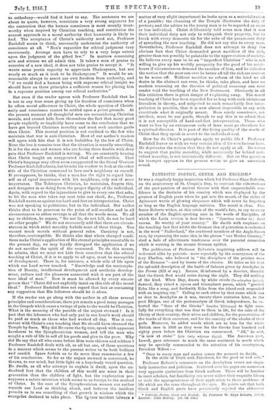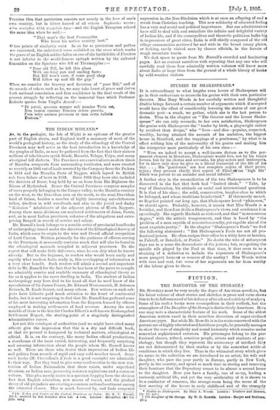PATRIOTIC POETRY. GREEK AND ENGLISII.*
IT was a singularly happy inspiration which led Professor Rhys Roberts, on the anniversary of St. Crispin's Day, to contrast the exhortations of the poet-patriots of ancient Greece with that unquenchable con- fidence in the destinies of his country which was displayed by the greatest of English poets when he put into the mouth of the victor of Agincourt words of glowing eloquence which will never be forgotten so long as the English language survives. The moral is clear. Pro- fessor Roberts wishes, at this crisis of the world's fate, to say to every member of the English-speaking race in the words of Euripides, of which the Latin version is best known : "Spartam naclus ea ; hone =mita. Be worthy of your country." He dwells with emphasis on the touching fact that whilst the German idea of patriotism is embodied in the word "Fatherland," the scattered members of the Anglo-Saxon race, by expressing the same idea in the phrase "our Mother Country," shed a halo of affectionate tenderness over the parental connexion which is wanting in the sterner German epithet.
The publication of Professor Roberts's inspiriting address will be welcomed alike by patriots—more especially by the countrymen of the fiery Fluellen, who believed in "the disciplines of the pristine wars of the Romans "—and by lovers of the classics. He takes as his text the splendid description of the battle of Salamis given by Aeschylus in the Persae (353 et seq.). Xerxes, ill-informed by a deserter, thought that the Greek fleet would retire during the night. They did nothing of the kind. When Day, drawn by white steeds (XEtordircoXor dawned, they raised a joyous and triumphant paean, which "greeted Echo like a song, and forthwith Echo from the island-rook responded with an inspiring cry." Calling to each other by that name which was as dear to Aeschylus as it was, twenty-three centuries later, to the poet Rhigas, one of the protomartyrs of Greek independence, he ex- horted the "Sons of the Greeks" (irceiaes 'EXX4row) to fight man- fully for everything that was dear to them in life, for the sake of the liberty of their country, their wives and children, for the preservation of the tombs of their ancestors, and for the sanctity of the abodes of their gods. Moreover, he added words which are as true for the whole British race in 1916 as they were for the Greeks four hundred and eighty years before the Christian era commenced. "All," he said, "is now at stake" (yip inr4p inivrwv (17(10. The American poet, Lowell, gave utterance to much the same sentiment in words which may be specially commended to the attention of his countryman, President Wilson :— " Once to every man and nation comes the moment to decide,
In the strife of Truth with Falsehood, for the good or evil side."
Professor Roberts's comments on the Aeschylean verses are singu- larly instructive and judicious. Scattered over his pages are numerous very apposite quotations from Greek authors. These will be familiar to most scholars, but familiarity can never wither their exquisite bloom or stale the appropriateness of their applk.ation to those problems of life which are the same throughout the ages. He points out that both Greek and English poets have persistently rejected the abhorrent
• Patriotic Poetry, Greek and English. By Professor W. Rhys Roberts. London: John Murray. (33. 04. net.] Prussian idea that patriotism consists not merely in the love of one's own country, but in bitter hatred of all others. Sophoeles wrote : 40T0L avvgx8etv &XXa criltituXeiv Nev—and the English Tennyson echoed the same idea when he said :—
" That man's the best Cosmopolite Who loves his native country best."
0 her points of similarity exist In so far as patriotism and pathos are concerned, the unlettered verse scribbled on the cross which marks the grave of an English soldier fallen on one of the battlefields of Flanders is not inferior to the world-famous epitaph written by the cultured Simonides on the Spartans who fell at Thermopylae :—
"Poor old Bill, he left this place With smoking gun and smiling face: But Bill won't care, if some good chap Will follow up and fill the gap."
When we consider the bravery and devotion of "poor Bill," and of thensands of others such as he, we may take heart of grace and derive loth national consolation and firm confidence in the final result of the present struggle by reflecting on the immortal lines which Professor Roberts quotes from Virgil's Aeneicl :— " Di patrii, quorum semper sub nnmine Troia eat, Non tamen omnino Teueros delere pariahs, Cum tales animos juvenum et tam eerta tulistis Pectora."











































 Previous page
Previous page